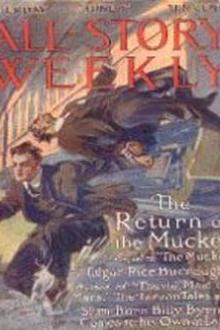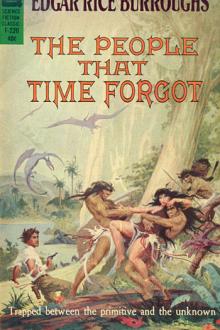The Return of the Mucker - Edgar Rice Burroughs (my miracle luna book free read .TXT) 📗

- Author: Edgar Rice Burroughs
- Performer: -
Book online «The Return of the Mucker - Edgar Rice Burroughs (my miracle luna book free read .TXT) 📗». Author Edgar Rice Burroughs
The Return of the Mucker
by Edgar Rice Burroughs
1921
BILLY BYRNE squared his broad shoulders and filled his deep lungs with the familiar medium which is known as air in Chicago. He was standing upon the platform of a New York Central train that was pulling into the La Salle Street Station, and though the young man was far from happy something in the nature of content pervaded his being, for he was coming home.
After something more than a year of world wandering and strange adventure Billy Byrne was coming back to the great West Side and Grand Avenue.
Now there is not much upon either side or down the center of long and tortuous Grand Avenue to arouse enthusiasm, nor was Billy particularly enthusiastic about that more or less squalid thoroughfare.
The thing that exalted Billy was the idea that he was coming back to SHOW THEM. He had left under a cloud and with a reputation for genuine toughness and rowdyism that has seen few parallels even in the ungentle district of his birth and upbringing.
A girl had changed him. She was as far removed from Billy’s sphere as the stars themselves; but Billy had loved her and learned from her, and in trying to become more as he knew the men of her class were he had sloughed off much of the uncouthness that had always been a part of him, and all of the rowdyism. Billy Byrne was no longer the mucker.
He had given her up because he imagined the gulf between Grand Avenue and Riverside Drive to be unbridgeable; but he still clung to the ideals she had awakened in him. He still sought to be all that she might wish him to be, even though he realized that he never should see her again.
Grand Avenue would be the easiest place to forget his sorrow—her he could never forget. And then, his newly awakened pride urged him back to the haunts of his former life that he might, as he would put it himself, show them. He wanted the gang to see that he, Billy Byrne, wasn’t afraid to be decent. He wanted some of the neighbors to realize that he could work steadily and earn an honest living, and he looked forward with delight to the pleasure and satisfaction of rubbing it in to some of the saloon keepers and bartenders who had helped keep him drunk some five days out of seven, for Billy didn’t drink any more.
But most of all he wanted to vindicate himself in the eyes of the once-hated law. He wanted to clear his record of the unjust charge of murder which had sent him scurrying out of Chicago over a year before, that night that Patrolman Stanley Lasky of the Lake Street Station had tipped him off that Sheehan had implicated him in the murder of old man Schneider.
Now Billy Byrne had not killed Schneider. He had been nowhere near the old fellow’s saloon at the time of the holdup; but Sheehan, who had been arrested and charged with the crime, was an old enemy of Billy’s, and Sheehan had seen a chance to divert some of the suspicion from himself and square accounts with Byrne at the same time.
The new Billy Byrne was ready to accept at face value everything which seemed to belong in any way to the environment of that exalted realm where dwelt the girl he loved. Law, order, and justice appeared to Billy in a new light since he had rubbed elbows with the cultured and refined.
He no longer distrusted or feared them. They would give him what he sought—a square deal.
It seemed odd to Billy that he should be seeking anything from the law or its minions. For years he had waged a perpetual battle with both. Now he was coming back voluntarily to give himself up, with every conviction that he should be exonerated quickly. Billy, knowing his own innocence, realizing his own integrity, assumed that others must immediately appreciate both.
“First,” thought Billy, “I’ll go take a look at little old Grand Ave., then I’ll give myself up. The trial may take a long time, an’ if it does I want to see some of the old bunch first.”
So Billy entered an “L” coach and leaning on the sill of an open window watched grimy Chicago rattle past until the guard’s “Granavenoo” announced the end of his journey.
Maggie Shane was sitting on the upper step of the long flight of stairs which lean precariously against the scarred face of the frame residence upon the second floor front of which the lares and penates of the Shane family are crowded into three ill-smelling rooms.
It was Saturday and Maggie was off. She sat there rather disconsolate for there was a dearth of beaux for Maggie, none having arisen to fill the aching void left by the sudden departure of “Coke” Sheehan since that worthy gentleman had sought a more salubrious clime—to the consternation of both Maggie Shane and Mr. Sheehan’s bondsmen.
Maggie scowled down upon the frowsy street filled with frowsy women and frowsy children. She scowled upon the street cars rumbling by with their frowsy loads. Occasionally she varied the monotony by drawing out her chewing gum to wondrous lengths, holding one end between a thumb and finger and the other between her teeth.
Presently Maggie spied a rather pleasing figure sauntering up the sidewalk upon her side of the street. The man was too far away for her to recognize his features, but his size and bearing and general appearance appealed to the lonesome Maggie. She hoped it was someone she knew, or with whom she might easily become acquainted, for Maggie was bored to death.
She patted the hair at the back of her head and righted the mop which hung over one eye. Then she rearranged her skirts and waited. As the man approached she saw that he was better looking than she had even dared to hope, and that there was something extremely familiar about his appearance. It was not, though, until he was almost in front of the house that he looked up at the girl and she recognized him.
Then Maggie Shane gasped and clutched the handrail at her side. An instant later the man was past and continuing his way along the sidewalk.
Maggie Shane glared after him for a minute, then she ran quickly down the stairs and into a grocery store a few doors west, where she asked if she might use the telephone.
“Gimme West 2063,” she demanded of the operator, and a moment later: “Is this Lake Street?”
“Well say, Billy Byrne’s back. I just see him.”
“Yes an’ never mind who I am; but if youse guys want him he’s walkin’ west on Grand Avenoo right now. I just this minute seen him near Lincoln,” and she smashed the receiver back into its hook.
Billy Byrne thought that he would look in on his mother, not that he expected to be welcomed even though she might happen to be sober, or not that he cared to see her; but Billy’s whole manner of thought had altered within the year, and something now seemed to tell him that it was his duty to do the thing he contemplated. Maybe he might even be of help to her.
But when he reached the gloomy neighborhood in which his childhood had been spent it was to learn that his mother was dead and that another family occupied the tumble-down cottage that had been his home.
If Billy Byrne felt any sorrow because of his mother’s death he did not reveal it outwardly. He owed her nothing but for kicks and cuffs received, and for the surroundings and influences that had started him upon a life of crime at an age when most boys are just entering grammar school.
Really the man was relieved that he had not had to see her, and it was with a lighter step that he turned back to retrace his way along Grand Avenue. No one of the few he had met who recognized him had seemed particularly delighted at his return. The whole affair had been something of a disappointment. Therefore Billy determined to go at once to the Lake Street Station and learn the status of the Schneider murder case. Possibly they had discovered the real murderer, and if that was the case Billy would be permitted to go his way; but if not then he could give himself up and ask for a trial, that he might be exonerated.
As he neared Wood Street two men who had been watching his approach stepped into the doorway of a saloon, and as he passed they stepped out again behind him. One upon either side they seized him.
Billy turned to remonstrate.
“Come easy now, Byrne,” admonished one of the men, “an’ don’t make no fuss.”
“Oh,” said Billy, “it’s you, is it? Well, I was just goin’ over to the station to give myself up.”
Both men laughed, skeptically. “We’ll just save you the trouble,” said one of them. “We’ll take you over. You might lose your way if you tried to go alone.”
Billy went along in silence the rest of the way to where the patrol waited at another corner. He saw there was nothing to be gained by talking to these detectives; but he found the lieutenant equally inclined to doubt his intentions. He, too, only laughed when Billy assured him that he was on his way to the station at the very instant of arrest.
As the weeks dragged along, and Billy Byrne found no friendly interest in himself or his desire to live on the square, and no belief in his protestations that he had had naught to do with the killing of Schneider he began to have his doubts as to the wisdom of his act.
He also commenced to entertain some of his former opinions of the police, and of the law of which they are supposed to be the guardians. A cell-mate told him that the papers had scored the department heavily for their failure to apprehend the murderer of the inoffensive old Schneider, and that public opinion had been so aroused that a general police shakeup had followed.
The result was that the police were keen to fasten the guilt upon someone—they did not care whom, so long as it was someone who was in their custody.
“You may not o’ done it,” ventured the cell-mate; “but they’ll send you up for it, if they can’t hang you. They’re goin’ to try to get the death sentence. They hain’t got no love for you, Byrne. You caused ‘em a lot o’ throuble in your day an’ they haven’t forgot it. I’d hate to be in your boots.”
Billy Byrne shrugged. Where were his dreams of justice? They seemed to have faded back into the old distrust and hatred. He shook himself and conjured in his mind the vision of a beautiful girl who had believed in him and trusted him— who had inculcated within him a love for all that was finest and best in true manhood, for the very things that he had most hated all the years of his life before she had come into his existence to alter it and him.
And then Billy





Comments (0)